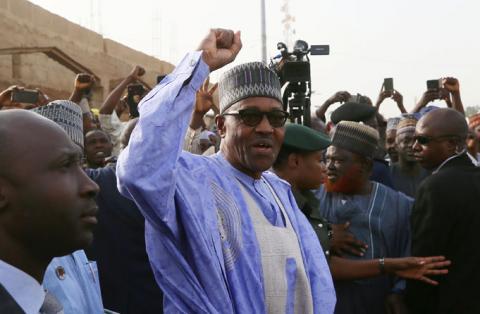Advertisement
Buhari's stronghold becomes key battleground in tight Nigeria election
KANO, (Reuters) - Sunday Nicholas voted for Muhammadu Buhari in Nigeria's 2015 presidential election, but the 32-year-old factory worker in the northern city of Kano was casting his ballot on Saturday for the president's challenger, Atiku Abubakar.
"Most of the (workers) cannot feed their families," Nicholas said as he queued in a dusty schoolyard to vote. People are suffering, he said. "There is no improvement."
If Buhari is turfed out of office when the results are tallied this week a major cause is likely to be defections by voters in the northwest, once Buhari's most important electoral stronghold, where anger over a feeble economy and disaffection from local bigwigs has loosened his grip.
A quarter of Nigeria's nearly 73 million eligible voters are in the northwest, the country's most densely-populated region. Buhari received nearly 90 percent of Kano state's vote in 2015, running up a 1.7 million vote edge that accounted for more than half of his final margin of victory over then-president Goodluck Jonathan.
But he faces stiffer headwinds this time around. Many voters are dissatisfied with an economy still sputtering after a 2016 recession. And his main opponent Atiku is also a northern Muslim rather than a southern Christian like Jonathan.
Atiku stands to benefit from the support of influential local powerbrokers who have rallied behind the opposition candidate after falling out with Buhari and his allies.
The most important among them, Rabiu Kwankwaso, is a senator, two-time governor of Kano State and so-called "godfather", a term for local Nigerian kingmakers who draw their influence from elaborate patronage networks.
The 62-year-old Kwankwaso has a loyal core of supporters known as "Kwankwasiyya" who are readily identifiable by their woven red caps. He quit Buhari's ruling All Progressives Congress (APC) last year amid a wave of defections to the opposition People's Democratic Party (PDP).
In a sign of Kano's newfound battleground status, Kwankwasiyya members on their way to a rally outside Kano city clashed with APC members on Thursday, leading to several injuries and torched vehicles. Each side blamed the other.
PDP officials say Atiku could net as much as 40 or even 50 percent of the vote in Kano State. APC supporters dismiss that, although they concede that Atiku will make some inroads.
"It will not be like what happened in 2015," said Baballe Hayatu, 40, an actor in the local film industry, who was waiting to vote for Buhari.
"There was this security challenge so everyone was desperate in 2015," he said, referring to surging violence by militant group Boko Haram at the time that fed widespread rejection of Jonathan.
But even if his four years in office have taken some of the lustre off Buhari, he remains popular in Kano, perceived by many as an incorruptible foe of the rampant graft that has plagued Nigerian politics for decades.
"He's an honest man. He's a correct leader," said Zainab Habib Haruna, 32, a teacher.
(Writing by Aaron Ross; Editing by Alexis Akwagyiram and Peter Graff)



















Add new comment